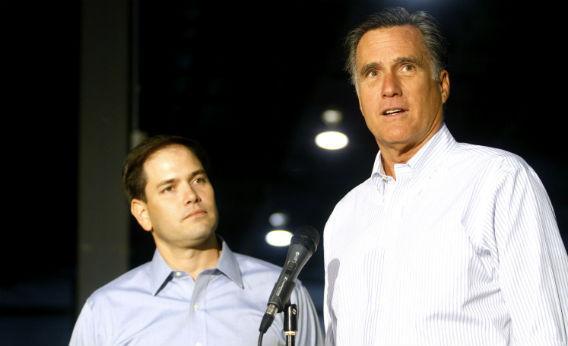Marco Rubio is this year’s Sarah Palin. As a possible vice presidential pick, he is popular with the grassroots. He is an envoy to a key part of the electorate and has crossover political appeal. He has successfully bucked his party establishment, and those who have seen him work say he’s skilled. He’s an easy and talented campaigner, and he’d wow them in Tampa the way Palin did in St. Paul, Minn.* He is also fundamentally at odds with his potential running mate’s message and criteria for his vice president.
Mitt Romney is the candidate of executive experience. It’s not just that he was a “business guy” for 25 years. He was a business guy who made tough decisions. He told us this often during the primaries. Romney’s key critique of President Obama is that he lacks such experience. In evaluating possible veeps, Romney has said, above all else, he wants to pick someone who can step into the job if necessary. That means Romney’s No. 2 must have the same kind of experience—or at least some of it. Maybe just a hint? A thimble? Marco Rubio, at age 40, has none. (Unless someone counts two years as a part-time city commissioner.)
Mitt Romney isn’t the only one who praises executive experience. Republicans have long heralded that quality. It’s why so many Republicans liked governors and former governors like Mitch Daniels, Chris Christie, and Jeb Bush. Lamar Alexander cited the quality in his endorsement of Romney. So did Sen. Ron Johnson.* It was perhaps the talking point for the various legislators and luminaries who have endorsed Romney. Gov. Christie, who is often cited by Republicans as the party’s expert on leadership, goes on about the executive temperament rather extensively: “Let’s be very leery, very wary of sending another member of Congress to the White House. Now see members of Congress, they can be OK, but they don’t know the first thing most of the time about using executive authority. They don’t know the first thing about getting things done.”
Experience making tough calls was the key criteria George W. Bush used to pick Dick Cheney. Yesterday, Cheney, who has been involved in several vice presidential selections, offered his views: “The single most important criteria has to be the capacity to be president.” Cheney said “talking heads” will call for a vice presidential candidate who’s a woman, Hispanic, or who is from a “big state.” “Those are interesting things to speculate about …. It’s pretty rare that the election turns on those kinds of issues.” Not only is Cheney agreeing with Nate Silver about the politics, but on the merits he would seem to be ruling out Marco Rubio.
You can mount a strong argument that no life experience prepares you for the presidency. Abraham Lincoln, our greatest president, had a relatively thin résumé with zero executive experience. (He had even less legislative experience than Rubio and unlike Rubio never rose to be speaker of his legislature.) Problem: This is not the case that Romney has made. He’s made the opposite case.
Of course, Romney does have an out. One of the truths of vice presidential searches is that if you want the job, you should say you don’t want it. The other is that candidates can change the criteria they set for the job when they pick someone who doesn’t meet them. That is what John McCain did with Sarah Palin. During the primary race, McCain prized foreign policy experience above all else. A top attack line against Romney in the opposition file was “Mitt Romney has no foreign policy experience.” It was also McCain’s knock against Obama that he lacked any experience with the wider world. Then McCain picked Palin, who had more executive experience than Barack Obama but no real foreign policy experience, so never mind all that.
Romney has less room to throw his previous convictions overboard, since his opponents have regularly argued that he has a penchant for disposable conviction. One of the open questions of this election is whether voters unhappy about the economy care about this kind of thing. If so, it’s bad news for Romney. In the latest NBC/Wall Street Journal poll, Romney trails the president on whether he is consistent and stands up for his beliefs (41 percent to 30 percent) and being honest and straightforward (37 percent to 30 percent).
Regardless of whether Romney has any intention of picking Sen. Rubio, the courtship offers plenty of political benefit for both men. Rubio gets to raise his profile as a national figure. Romney can ingratiate himself with Florida voters who presumably won’t mind the association (and who perhaps won’t remember the mean things Romney’s spokesperson used to say about Rubio when she worked for one of his opponents). Hispanic voters might be more open to the idea of a Romney candidacy if he shows himself to be carefully considering the softer immigration ideas of a Republican of Cuban heritage.
Picking a vice president is the only presidential-level decision Romney will get to make before Americans vote in November. Romney has argued that his business career gives him special insight and leadership abilities. There are only a few ways to test this thesis. Evaluating his jobs record as a businessman turned governor is one, and evaluating how he makes his first top-level personnel decision is another. Romney has shown a laudable ability to ignore the day-to-day madness of the presidential cycle, keep his eye on what’s important. Romney may face his toughest test yet in avoiding the allure of Marco Rubio.
Corrections, April 25, 2012: This article originally stated that Palin wowed conservatives with a speech in Denver. It was in St. Paul, Minn. (Return to the corrected sentence.) Also, because of an editing error, this article originally misidentified Sen. Ron Johnson as Tim Johnson. (Return to the corrected sentence.)
